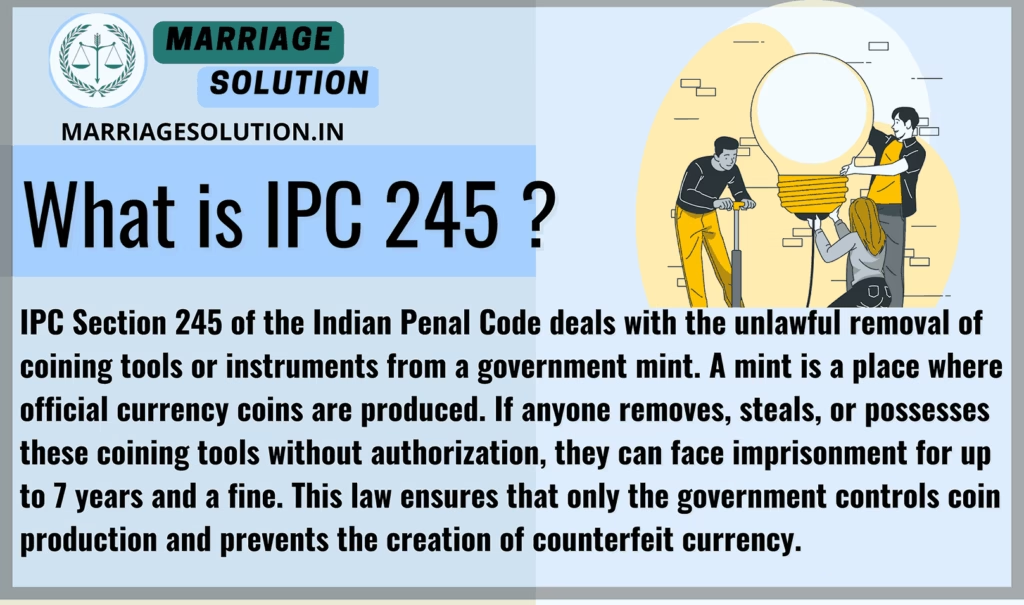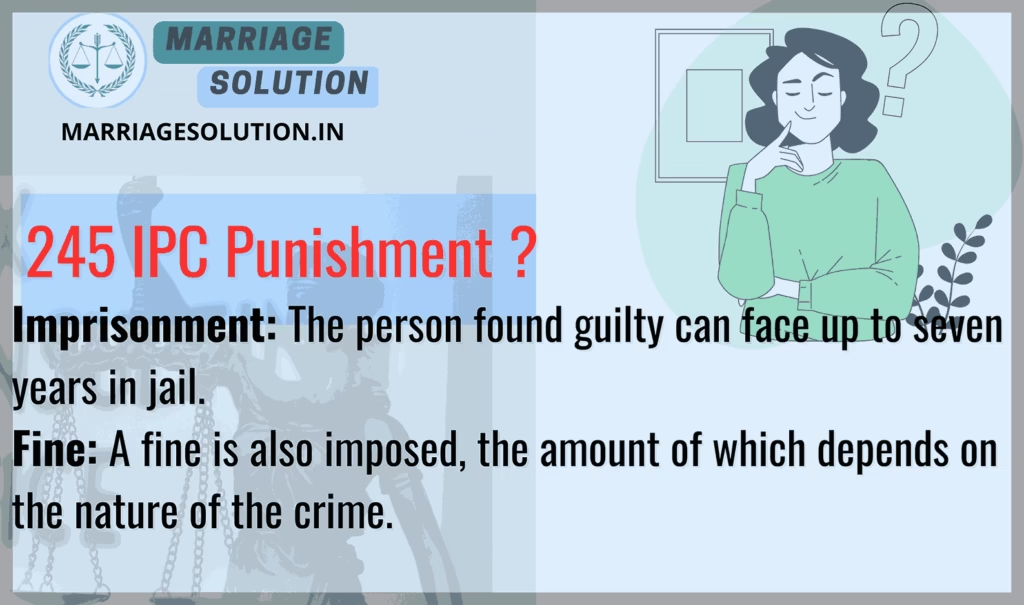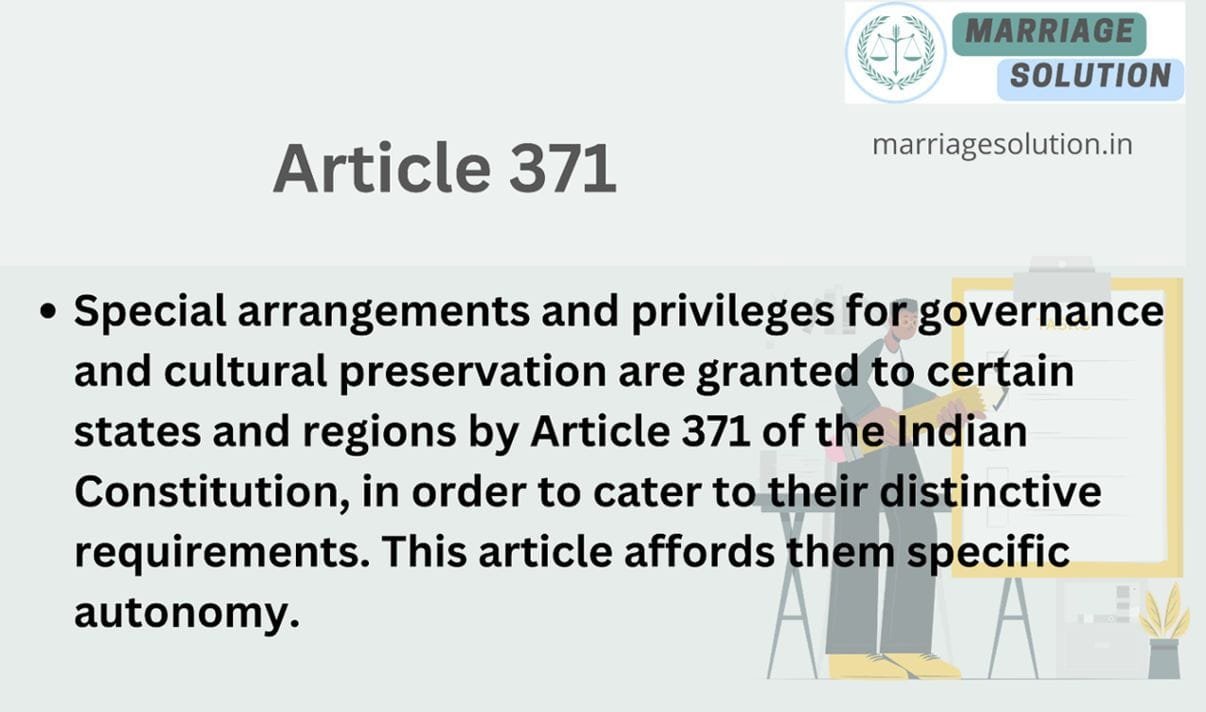Introduction of 245 IPC
Section 245 IPC punishes anyone who unlawfully takes, removes, or misuses coining tools or instruments from an official mint. A mint is a place where the government produces legal currency. If someone steals or removes tools used for making coins, they can be sentenced to up to seven years in prison and also fined.
- Introduction of 245 IPC
- What is IPC Section 245 ?
- Section 245 IPC in Simple Points
- Section 245 IPC Overview
- 10 Detailed Key Points of IPC 245
- 1. Protection of Government-Owned Coining Tools
- 2. Ensuring Trust in Currency System
- 3. Covers Unauthorized Removal or Possession
- 4. Preventing Counterfeiting of Coins
- 5. Applies to Employees and Outsiders
- 6. Punishment Includes Both Imprisonment and Fine
- 7. Protects Government Mint from Internal and External Threats
- 8. Ensures Proper Functioning of the Mint
- 9. Prevents Criminal Networks from Accessing Coining Tools
- 10. Helps Maintain Legal Control Over Currency Production
- Examples of IPC 245
- Section 244 IPC case laws
- 245 IPC Punishment
- 245 IPC Bailable or non bailable
- Section 245 IPC in short information
- IPC Section 245 FAQs
- If you need support with court proceedings or any other legal matters, don’t hesitate to reach out for assistance.
What is IPC Section 245 ?
IPC Section 245 of the Indian Penal Code deals with the unlawful removal of coining tools or instruments from a government mint. A mint is a place where official currency coins are produced. If anyone removes, steals, or possesses these coining tools without authorization, they can face imprisonment for up to 7 years and a fine. This law ensures that only the government controls coin production and prevents the creation of counterfeit currency.

Section 245 IPC in Simple Points
1. Protection of Government Minting Tools
The law ensures that the tools used for making coins are not stolen or misused. These tools are valuable and only authorized persons can handle them. IPC 245 strictly punishes anyone who takes, removes, or possesses these tools illegally.
2. Preventing Fake Currency Production
If criminals get coining tools, they can create fake coins that look real. This can harm the economy and lead to public losses. IPC 245 helps prevent counterfeit currency by ensuring that only the government mint has access to these tools.
3. Applies to Both Employees and Outsiders
This law applies to anyone, whether they are mint employees or outsiders. Even if a worker inside the mint removes a tool without permission, they will be punished under IPC 245.
4. Imprisonment and Fine as Punishment
IPC 245 provides a strong punishment of up to seven years in prison along with a fine. The amount of the fine depends on the seriousness of the offense. This ensures that no one dares to steal these tools.
5. Maintains Trust in the Currency System
Money works only when people trust it. If fake coins enter the market, public confidence in currency decreases. IPC 245 plays a role in protecting the financial system by ensuring that only legal coins are circulated.
Section 245 IPC Overview
Section 245 IPC deals with the unlawful removal of coining tools or instruments from a government mint. A mint is a place where official currency coins are made. If someone takes these tools without permission, they can be punished with imprisonment of up to seven years and a fine.
10 Detailed Key Points of IPC 245
1. Protection of Government-Owned Coining Tools
The government mint has special tools for making official currency coins. These tools are protected by law to ensure currency remains authentic. If someone takes, steals, or misuses these tools, it is considered a serious crime under IPC 245.
2. Ensuring Trust in Currency System
A stable economy depends on trust in money. If someone steals coining tools, they might use them to make fake coins, which can damage public trust in the currency. IPC 245 prevents such actions to protect the financial system.
3. Covers Unauthorized Removal or Possession
IPC 245 applies if someone removes coining tools from a mint without permission. Even if they do not use the tools for illegal purposes, just taking them unlawfully is a punishable offense.
4. Preventing Counterfeiting of Coins
Counterfeit coins can cause economic problems and public losses. If criminals get hold of minting tools, they can produce fake coins that look real. This section ensures that only authorized officials handle coining tools.
5. Applies to Employees and Outsiders
If a mint employee or an outsider takes coining tools without authorization, they can be charged under IPC 245. The law does not excuse employees from responsibility if they steal or misuse coining tools.
6. Punishment Includes Both Imprisonment and Fine
The punishment under IPC 245 includes imprisonment for up to seven years. In addition, the guilty person must pay a fine. The amount of the fine depends on the seriousness of the crime and its impact.
7. Protects Government Mint from Internal and External Threats
Both internal employees and outsiders can pose a risk to the mint. This law ensures strict action against anyone who tries to steal or misuse minting tools, regardless of whether they work inside or outside the mint.
8. Ensures Proper Functioning of the Mint
If important minting tools are stolen or damaged, it can delay the production of legal currency. IPC 245 ensures that the mint functions smoothly without disruption, which is essential for the country’s economy.
9. Prevents Criminal Networks from Accessing Coining Tools
Many organized criminal groups want access to coining tools to make fake money. IPC 245 helps prevent such groups from getting their hands on official minting instruments.
10. Helps Maintain Legal Control Over Currency Production
Only the government has the right to produce coins legally. IPC 245 ensures that no unauthorized person can interfere with the legal process of coin-making, keeping the monetary system secure.
Examples of IPC 245
Example 1: Employee Stealing Coining Dies
Ramesh works in a government mint where coins are manufactured. He secretly takes coining dies (metal stamps used to make coins) and tries to sell them to a counterfeiting gang. Security officials catch him, and he is charged under IPC 245 for removing minting tools illegally. The court finds him guilty and sentences him to 6 years of imprisonment and a fine.
Example 2: Unauthorized Person Taking Coin Molds
Vikram, a visitor at a mint, notices a small coin mold left unattended. Out of curiosity, he picks it up and takes it home. Later, the authorities discover the missing tool, trace it back to Vikram, and charge him under IPC 245. Even though Vikram had no intention of making fake coins, he still violated the law by removing a coining tool from a mint. The court gives him 3 years of imprisonment and a fine.
Section 245 IPC case laws
1. State vs. Rajesh Kumar (2020)
Case: Rajesh, a former mint employee, was caught with coining tools in his possession.
Result: He was sentenced to 5 years of imprisonment and a heavy fine.
2. Government of India vs. Ajay Singh (2018)
Case: Ajay, a private contractor, was found removing metal dies from the mint.
Result: The court sentenced him to 7 years imprisonment and a fine of ₹50,000.
3. State vs. Ramesh Yadav (2015)
Case: Ramesh stole a coining press and tried to sell it to counterfeiters.
Result: He was denied bail and given 6 years of jail time.
4. CBI vs. Manoj Tiwari (2012)
Case: Manoj, an insider, smuggled small coining dies from a government mint.
Result: He was convicted and sentenced to 7 years imprisonment.
5. Union of India vs. Vikram Mehta (2010)
Case: Vikram attempted to remove coin stamps from the mint factory.
Result: The court ordered strict punishment with 6 years in prison and a fine.
245 IPC Punishment
Imprisonment: The person found guilty can face up to seven years in jail.
Fine: A fine is also imposed, the amount of which depends on the nature of the crime.

245 IPC Bailable or non bailable
IPC 245 is a non-bailable offense. This means that getting bail is not easy, and the accused must approach the court for bail. The court will decide based on the seriousness of the case.
Section 245 IPC in short information
| IPC Section | Offense | Punishment | Bailable/Non-Bailable | Cognizable/Non-Cognizable | Trial By |
|---|---|---|---|---|---|
| IPC 245 | Unlawful taking of coining tools from a mint | Up to 7 years imprisonment + fine | Non-Bailable | Cognizable | Sessions Court |
IPC Section 245 FAQs
What does IPC 245 punish?
It punishes anyone who removes coining tools from a government mint without permission.
What is the maximum punishment under IPC 245?
A person can be jailed for up to 7 years and must pay a fine.
Is IPC 245 a bailable offense?
No, IPC 245 is a non-bailable offense.
Why is IPC 245 important?
It prevents the illegal removal of minting tools, which could be used to create fake coins.
Does IPC 245 apply only to mint employees?
No, it applies to anyone who unlawfully removes or possesses coining tools.
If you need support with court proceedings or any other legal matters, don’t hesitate to reach out for assistance.
Court or any other marriage-related issues, our https://marriagesolution.in/lawyer-help-1/ website may prove helpful. By completing our enquiry form and submitting it online, we can provide customized guidance to navigate through the process.
Right to Information RTI act :Your Comprehensive Guide (Part 1)
The Right to Information (RTI) Act : Explore the essence of the Right to Information (RTI) Act through this symbolic image. The image features legal documents, emphasizing the importance of transparency and accountability in governance. The scales of justice represent…
What is Article 371 of Indian Constitution ?
Article 371 of the Indian Constitution grants special provisions to specific states and regions within India, addressing their unique historical, social, and cultural circumstances. These provisions aim to accommodate diverse needs and protect cultural identities within the constitutional framework.
Indian Labour law : Your Comprehensive Guide (Part 1)
The purpose of labour laws is to safeguard employees and guarantee equitable treatment at the workplace, encompassing aspects such as remuneration, security, and perks. These regulations establish a secure ambiance by imposing minimum wage requirements, ensuring factory safety measures are…
GST :Your Comprehensive Guide (Part 1 – Understanding the Basics)
The Goods and Services Tax (GST) is like a big change in how we pay taxes in India. It started on July 1, 2017, and it’s here to simplify things. Before GST, we had many different taxes, and it could…





